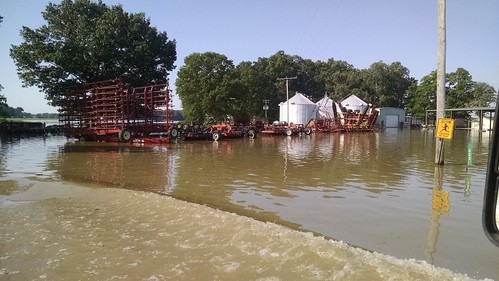Flood of emotions: Coping with disaster-related feelings of loss, frustration, helplessness
By Mary Hightower
U of A System Division of Agriculture
Fast Facts:
- Dealing with disaster takes time; support
- Disaster, emergencies bring out people’s baseline coping strategies
(700 words)
LITTLE ROCK – Beyond the physical loss from a disaster, come the flood of emotions: Helplessness. Frustration. Grief.
These are some of the emotions those affected by this week’s flooding may be experiencing.

Coping will take time and a willingness to trust the support of others, said Brittney Schrick, assistant professor and extension family life specialist for the University of Arkansas System Division of Agriculture.
“Don’t rush recovery, give yourself time to grieve or be upset and don’t be ashamed to utilize offered resources or help,” she said Thursday. “Connect to family, friends, and other support, keep to routine as much as possible.”
Routine could mean going to school or work where possible, and eating family meals together.
One routine to avoid is constant exposure to bad news.
“Avoid being sucked into constant media coverage of the event,” Schrick said, adding that it can reinforce negative emotions.
Coping strategies
“Disasters and emergencies bring out people’s baseline coping strategies,” she said. “For some, it is emotion-focused and others are problem-focused. Both have pros and cons.”
Emotion focused copers tend to try reducing negative emotion surrounding an event such as fear, embarrassment, depression, anxiety, etc.
“This may be the only realistic option when the source of the stress itself can’t be controlled or reduced,” Schrick said. “Some techniques include distraction, expressing emotions through discussion or writing, prayer or meditation, eating, drinking, or other self-medication, or suppressing the emotions.”
Problem-focused copers tend to target the sources of stress in practical ways in an attempt to reduce the stress.
“Strategies include problem-solving, time management, finding help, etc.,” she said. “In general, this type of stress management is best because it focuses on the stressor itself; however, in times like this when the stressor is outside one’s control, this may not be possible or may happen slowly.”
Schrick said a combination approach may work best.
“Acknowledging and talking about emotional responses to the situation while directly focusing on practical ways to regain control of the situation such as working on damaged property, finding resources for self and family, and attempting to maintain a sense of normalcy where possible can be helpful,” she said.
Helping children cope
Parents may find their children at loose ends as everyone tries to get their emotional arms around a disaster. Schrick suggests:
Encourage your children to share their feelings about what is going on, and be patient as they do so. “It is important that parents and other adults give kids room to express their fear and beliefs about what is happening,” she said. “Helping them understand that they are safe and you are listening is a step in the right direction.”
Clarify misunderstandings about risk and danger by answering questions. “Children, especially younger ones, are likely to fear that they are still in danger even when you know they are safe,” she said. “Explaining safety plans, reassuring them in a calm voice, and answering their questions patiently will help them feel safer. Although you are also stressed, their little minds can't quite comprehend when danger has passed.”
Monitor and limit media exposure. “If your area is still under imminent threat - for example, if the river has not yet crested, the rain is still falling, limit the type and duration of news to which your children are exposed,” Schrick said.
“In our current 24-hour news cycle, news channels have lots of time to fill, and they tend to do so by repeating the same dire warnings over and over,” she said. “For a frightened child, watching cars spinning off the road in high water is terrifying. Older children and teens may be very curious about what is going on, and they are likely able to handle more information. Younger kids need to be insulated and have their information filtered through a trusted adult.”
Help your kids to engage in as much routine behavior as possible. “Kids thrive on routine, and in uncertain times, that routine is highly comforting,” Schrick said. “Try to maintain a typical bedtime routine even if you are displaced. Spend extra time with your child to reassure them that they are safe and that you are too.”
For more information on coping strategies, see Schrick’s blog at: https://uaex.uada.edu/life-skills-wellness/personal-family-well-being/family-life-fridays-blog/default.aspx.
Pursuant to 7 CFR § 15.3, the University of Arkansas System Division of Agriculture offers all its Extension and Research programs and services (including employment) without regard to race, color, sex, national origin, religion, age, disability, marital or veteran status, genetic information, sexual preference, pregnancy or any other legally protected status, and is an equal opportunity institution.
# # #
Media Contact: Mary Hightower
Dir. of Communication Services
U of A System Division of Agriculture
Cooperative Extension Service
(501) 671-2126
mhightower@uada.edu
Related Links